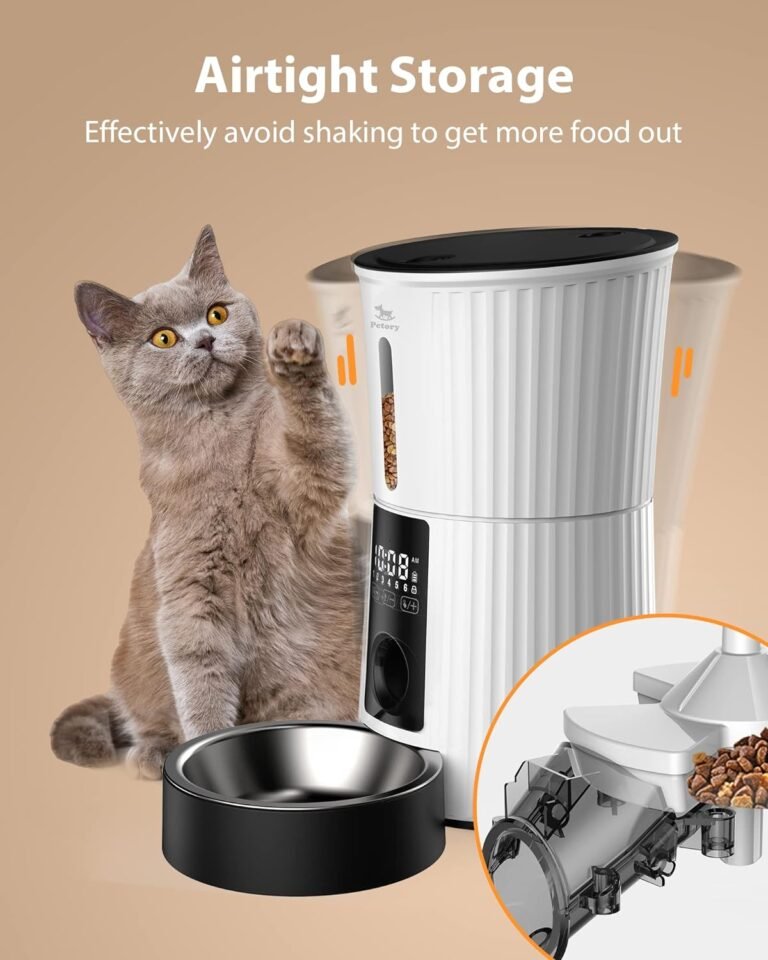Senior Pets and Mental Health: Special Considerations
Senior pets can have a positive impact on mental health, providing companionship, reducing stress, and increasing physical activity. However, there are special considerations that need to be taken into account when caring for senior pets. This includes addressing their health issues, adapting the environment, and choosing the right pet. Creating a safe and comfortable environment is crucial, as is maintaining the mental well-being of senior pets. Regular exercise, socialization, and monitoring behavioral changes are important for their overall well-being.
Key Takeaways
- Senior pets provide companionship and emotional support, reducing stress and anxiety.
- They can increase physical activity and provide a sense of purpose and responsibility.
- Special considerations for senior pets include addressing health issues and adapting the environment.
- Choosing the right senior pet involves matching energy levels and lifestyle, compatibility with other pets, and considering allergies.
- Creating a safe and comfortable environment includes providing a cozy bed, ensuring accessibility and mobility, and eliminating hazards and obstacles.
The Benefits of Senior Pets for Mental Health

Companionship and Emotional Support
Having a senior pet can provide you with love and companionship as well as improved physical, mental, and emotional health and well-being. Research has shown that human-animal interaction has a calming effect and can help in elevating mood. In fact, studies have found that people who have companion animals, including cats, are less likely to feel lonely and experience feelings of depression. Living with a senior pet can also decrease the number of aging-related health issues. It’s important to note that senior pets can also benefit from the companionship and emotional support they receive from their human caregivers. By providing a safe and loving environment, you can help your senior pet thrive and enjoy their golden years.
Reduced Stress and Anxiety
Spending time with a cat can have a calming effect on you, helping to reduce stress and anxiety levels. The gentle movements and playful behavior of cats have been linked to reduced anxiety. In fact, petting a cat for just ten minutes can decrease the amount of cortisol, a stress hormone, in saliva. Additionally, research has shown that having a cat can lower the risk of heart disease, which is often associated with anxiety. The purring sound made by cats is believed to have a therapeutic effect on the human body, further contributing to the reduction of anxiety. Cats truly have a remarkable ability to bring a sense of calm and relaxation into your life.
Increased Physical Activity
As our faithful companions gracefully age, their exercise routines warrant thoughtful adjustments to ensure they remain active and healthy without causing strain on their aging joints. Incorporating low-impact exercise tailored to their abilities becomes paramount in maintaining their vitality and comfort. Understanding the limitations that come with age, it’s important to prioritize their well-being by providing opportunities for gentle exercise. Regular walks at a comfortable pace can offer both exercise and moments of joyous exploration and bonding. Engaging in light play sessions that stimulate their minds and bodies gently is also beneficial. Remember to prioritize regular veterinary check-ups to monitor their health and address any concerns. By adapting their exercise routine and providing opportunities for physical activity, you can support their overall well-being and promote a healthy and active lifestyle.
Sense of Purpose and Responsibility
Having a senior pet can give you a sense of purpose and responsibility. Taking care of an older pet requires a special level of commitment and dedication. It’s important to provide them with the love and attention they need in their golden years.
One way to fulfill this sense of purpose is by ensuring that your senior pet has a comfortable and safe living environment. This includes providing them with a cozy bed and resting area where they can relax and sleep peacefully.
Additionally, it’s crucial to make sure that their environment is accessible and free from hazards and obstacles. This can help prevent accidents and injuries, ensuring their well-being.
To meet their nutritional needs, it’s essential to provide them with a balanced diet that is suitable for their age and health condition. Consult with your veterinarian to determine the best diet plan for your senior pet.
Remember, having a senior pet is a rewarding experience that brings joy and fulfillment to your life. By taking on the responsibility of caring for an older pet, you are making a positive impact on their well-being and providing them with a loving home.
Special Considerations for Senior Pets

Health Issues and Medical Care
When it comes to the health of your senior pet, early diagnosis is key. Regular visits to the veterinarian can help identify any emerging problems and minimize their impact on your pet’s quality of life. Each pet is unique, with their own set of health issues such as arthritis, weight management, dental problems, skin irritations, and more. Heart disease and the development of lumps are also common in older pets. That’s why it’s important to schedule regular check-ups to catch these issues early and improve outcomes. The veterinarian will perform a complete examination every six months, providing general advice and specific recommendations tailored to your pet’s needs. By staying proactive in your pet’s healthcare, you can ensure their whisker wellbeing and overall well-being.
Adapting the Environment
When it comes to adapting the environment for your senior pet, there are a few key considerations to keep in mind. First and foremost, comfort and safety should be your top priorities. Ensure that their living space is safe and free from obstacles that could cause them harm. Offer softer bedding to provide them with a cozy place to rest. Additionally, make sure they have easy access to water and food to meet their basic needs.
Another important aspect to consider is whisker wellbeing. Senior pets may have specific needs when it comes to their whiskers, so it’s important to be mindful of this. Avoid placing objects or furniture too close to their face, as this can cause discomfort.
In terms of veterinary care, regular check-ups become even more crucial as your pet ages. Increased frequency of vet visits allows for the early detection of age-related health issues. This way, any potential problems can be addressed promptly and effectively.
Lastly, don’t forget about nutrition. As your pet gets older, their nutritional requirements may change. It’s important to tailor their diet to meet these changing needs. Consult with your veterinarian to ensure that your senior pet is getting the right balance of nutrients to support their overall health and wellbeing.
Adjusting Daily Routine
When it comes to adjusting your daily routine for your senior pet, it’s important to consider their specific needs and limitations. Hemp Oil Shampoo can be a great option for maintaining their coat and skin health. Here are a few tips to help you create a routine that works for both of you:
- Establish a consistent schedule: Senior pets thrive on routine, so try to feed them, walk them, and play with them at the same times each day.
- Provide mental stimulation: Customizing exercise routines to suit their capabilities and providing mental challenges can maintain their physical and cognitive health.
- Make necessary modifications: As your pet ages, they may need some adjustments to their living space. Ensure they have easy access to their bed, food, and water, and minimize any obstacles that could cause them to trip or fall.
Remember, adjusting your daily routine to accommodate your senior pet’s needs can greatly contribute to their overall well-being and happiness.
Nutritional Needs
Tailoring a senior pet’s diet to meet their changing nutritional requirements is crucial. High-quality, easily digestible food helps manage weight and support their overall health. Providing proper hydration is also important for senior pets to maintain their well-being. It is recommended to ensure they have access to fresh water at all times. Additionally, monitoring their water intake and encouraging them to drink regularly can help prevent dehydration. If you notice any changes in their drinking habits or signs of dehydration, it is important to consult with a veterinarian for further guidance and potential treatment.
Choosing the Right Senior Pet

Matching Energy Levels and Lifestyle
When choosing a senior pet, it’s important to consider their energy levels and how well they match your lifestyle. Energy Levels can vary greatly among senior pets, just like humans. While some seniors may have boundless energy and remain active well into their retirement, others may have lower energy levels and prefer a more relaxed lifestyle. It’s crucial to remember that your own energy levels could change over time as well. A high-energy dog will require daily exercise and mental stimulation, even if you cannot provide it. On the other hand, a breed known for lower energy levels or a senior dog may be a better match for a retiree’s energy. It’s also important to consider the size of the dog. Large and extra-large dogs may not be suitable for seniors, especially if they have balance issues. Lifestyle is another important factor to consider. Some seniors may have specific lifestyle requirements or limitations that need to be taken into account when choosing a pet. By considering both energy levels and lifestyle, you can ensure a better match between you and your furry friend.
Compatibility with Other Pets
When choosing a senior pet, it’s important to consider their compatibility with other pets in your household. Introducing a new pet to your existing furry family members can be a delicate process, but with proper planning and patience, it can lead to a harmonious coexistence. Here are some tips to ensure a smooth transition:
- Gradual Introduction: Allow the pets to get acquainted with each other gradually, starting with short supervised interactions and gradually increasing the duration.
- Separate Spaces: Provide separate spaces for each pet, especially during the initial stages of introduction. This allows them to have their own safe retreats when needed.
- Positive Reinforcement: Reward positive interactions between the pets with treats and praise. This helps to reinforce good behavior and create positive associations.
Remember, a successful integration of a senior pet with other pets can provide companionship and enrich the lives of all involved. It’s important to monitor their interactions and seek professional guidance if any issues arise.
Size and Space Requirements
When choosing a senior pet, it’s important to consider their size and space requirements. Large and extra-large dogs may not be the best choice for seniors, especially if they are experiencing any issues with balance. These dogs can potentially injure people who are not as physically strong, and owning a large breed requires specific skills and training. Retirees may find that large dogs can be overwhelming and make it difficult to go for walks or move around safely. However, there are exceptions to this, as some large breeds are known for their gentle nature. It’s crucial to assess the senior’s experience with dogs, their living situation, and their ability to handle a larger pet. Additionally, the lifespan of the pet should be considered, as it’s important to plan for the future and ensure the pet will have a safe and loving home even after the senior passes away.
Consideration for Allergies
When choosing a senior pet, it’s important to consider any allergies you or your family members may have. While senior pets can provide numerous benefits for your mental and emotional well-being, it’s crucial to ensure that you can coexist comfortably with your furry companion. If you or a family member have allergies, it’s recommended to choose a pet that is hypoallergenic or has minimal shedding. This can help reduce the risk of allergic reactions and improve the overall experience of having a senior pet. Additionally, regular grooming and cleaning of your pet’s living area can also help minimize allergens in your home.
Creating a Safe and Comfortable Environment

Providing a Cozy Bed and Resting Area
Ensuring a safe and comfortable environment is essential for your senior pet’s well-being and happiness. Accommodate their limitations by offering softer bedding, easy access to water and food, and minimizing obstacles in their living space. Investing in orthopedic beds is a cornerstone of senior pet joint care. These specialized beds are crafted to offer unparalleled comfort and support, alleviating the strain on achy joints that often accompany age. By offering this cozy haven, you enable your senior pet to wake up refreshed and rejuvenated, ready to embrace the day. To ease their movements and minimize strain on their joints, consider incorporating ramps or steps. These aids provide a gentle incline or elevation, allowing your furry companion to access their favorite spots with ease. Regular veterinary check-ups are crucial for the early detection of age-related health issues. Tailoring a senior pet’s diet to meet their changing nutritional requirements is also crucial. High-quality, specially formulated senior pet food can help support their overall health and well-being. Remember, caring for our senior pets is a deeply enriching journey that requires understanding, patience, and love.
Ensuring Accessibility and Mobility
When it comes to ensuring the accessibility and mobility of your senior pet, there are a few key considerations to keep in mind. Comfort and safety should be your top priorities. Accommodate their limitations by offering softer bedding and easy access to water and food. Minimize obstacles in their living space to prevent any accidents or injuries. Additionally, you may want to consider incorporating ramps or steps to help minimize strain on their joints. These aids provide a gentle incline or elevation, allowing your furry companion to navigate elevated areas effortlessly. By making these adjustments, you can promote their independence and ensure their overall well-being.
Eliminating Hazards and Obstacles
When creating a safe and comfortable environment for your senior pet, it’s important to eliminate hazards and obstacles that could potentially cause harm. This includes removing any small objects that could be choking hazards, securing loose wires or cords to prevent tripping, and blocking off areas that may be dangerous for your pet to access. Additionally, consider senior-proofing your home by installing baby gates or ramps to help your pet navigate stairs or elevated surfaces.
To ensure the safety of your senior pet, it’s crucial to regularly inspect your home for any potential hazards. Check for loose floorboards or rugs that could cause your pet to slip or trip, and make sure all windows and doors are secure. Keep toxic substances such as cleaning products, medications, and plants out of your pet’s reach, as they can be harmful if ingested.
In order to provide a comfortable environment for your senior pet, consider providing a cozy bed and resting area where they can relax and sleep. Choose a bed that is supportive and easy for your pet to access, and make sure it’s placed in a quiet and peaceful area of your home. Ensure accessibility and mobility by providing ramps or steps for your pet to reach higher surfaces, and consider placing non-slip mats or rugs on slippery floors.
Remember, creating a safe and comfortable environment for your senior pet is essential for their well-being and overall mental health. By taking these steps to eliminate hazards and obstacles, you can help ensure that your pet can age gracefully and enjoy their golden years to the fullest.
Maintaining a Calm and Quiet Space
Creating a calm and quiet space for your senior pet is essential for their overall well-being. Comfort and safety should be the top priorities when designing their environment. Here are some tips to help you create a peaceful space for your furry friend:
- Soft bedding: Provide your senior pet with a cozy bed that offers support and comfort.
- Minimize noise: Reduce loud noises and create a quiet atmosphere to help your pet relax.
- Dim lighting: Use soft, gentle lighting to create a soothing ambiance.
- Eliminate distractions: Remove any potential distractions that may cause stress or anxiety.
Remember, a calm and quiet space can greatly contribute to your senior pet’s mental health and overall happiness.
Maintaining the Mental Well-being of Senior Pets

Regular Exercise and Mental Stimulation
Stimulation: Customising exercise routines to suit their capabilities and providing mental challenges can maintain their physical and cognitive health. Incorporate puzzle feeders into meal times. These ingenious contraptions not only slow down meal consumption but also encourage mental engagement as your furry friend works to retrieve their meal from the puzzle. Delve into a world of toys crafted to ignite your dog’s curiosity and problem-solving skills. Light play sessions, emphasizing games that don’t involve excessive jumping or sudden movements, can stimulate their minds and bodies gently. Prioritizing veterinary check-ups is essential for health monitoring and early detection of any issues.
Socialization and Interaction
Socialization and interaction are crucial for the well-being of senior pets. Just like humans, pets thrive on social connections and companionship. Regular socialization with other animals and humans can help prevent loneliness and isolation, which are common issues in older pets. It provides them with mental stimulation, reduces boredom, and promotes a sense of belonging.
To ensure that your senior pet gets enough socialization and interaction, consider the following:
- Playdates: Arrange playdates with other friendly and compatible pets to encourage social interaction.
- Visits to Pet-Friendly Places: Take your pet to pet-friendly parks, cafes, or events where they can meet and interact with other animals and pet owners.
- Enrichment Activities: Engage your pet in interactive toys, puzzles, and games that stimulate their mind and encourage social engagement.
Remember, socialization and interaction are essential for the overall happiness and mental well-being of your senior pet.
Monitoring Behavioral Changes
When caring for a senior pet, it is important to monitor behavioral changes closely. These changes can be indicators of underlying health issues or emotional distress. Keep an eye out for any unusual behaviors such as increased aggression, excessive barking, or changes in appetite. If you notice any of these changes, it is recommended to consult with a veterinarian to rule out any medical conditions.
In addition to monitoring, it is also important to provide a calm and stable environment for your senior pet. This can help reduce stress and anxiety, which can contribute to behavioral changes. Ensure that your pet has a comfortable resting area and eliminate any potential hazards or obstacles in their living space.
To better understand your pet’s behavior, you can also keep a behavioral journal. This can help you track any patterns or triggers that may be causing the changes. Note down any specific situations or events that coincide with the behavioral changes. This information can be valuable when discussing your pet’s behavior with a veterinarian or animal behaviorist.
Remember, early intervention is key when it comes to addressing behavioral changes in senior pets. By closely monitoring their behavior and seeking professional advice, you can help ensure their mental well-being and overall quality of life.
Addressing Cognitive Decline
As your senior pet enters their golden years, it’s important to be aware of the potential cognitive changes they may experience. Cognitive decline, which can include disorientation and behavioral changes, is a common part of aging in pets. Mental stimulation and specialized diets can help manage these symptoms and support your pet’s mental health. Additionally, regular vet check-ups can help identify and address any underlying health issues that may contribute to cognitive decline. Here are some strategies to address cognitive decline in your senior pet:
- Provide mental challenges and interactive toys to stimulate their cognitive abilities.
- Consider introducing puzzle feeders and toys that require problem-solving skills.
- Ensure a safe and comfortable environment by offering softer bedding and minimizing obstacles in their living space.
Remember, addressing cognitive decline is an important part of maintaining your senior pet’s overall well-being and quality of life.
Maintaining the Mental Well-being of Senior Pets
Conclusion
In conclusion, caring for senior pets requires special considerations to ensure their mental health and overall well-being. Regular veterinary check-ups, tailored nutrition, exercise and mental stimulation, and creating a comfortable and safe environment are essential. Age-related health issues such as arthritis, mobility problems, dental issues, and cognitive decline can be managed with proper care and early intervention. By providing the necessary support and attention, we can ensure that our senior pets live happy and fulfilling lives.
Frequently Asked Questions
What are the benefits of senior pets for mental health?
Senior pets provide companionship, emotional support, reduce stress and anxiety, increase physical activity, and give a sense of purpose and responsibility.
What are the special considerations for senior pets?
Special considerations for senior pets include health issues and medical care, adapting the environment, adjusting daily routine, and meeting their nutritional needs.
How do I choose the right senior pet?
When choosing a senior pet, consider matching energy levels and lifestyle, compatibility with other pets, size and space requirements, and any allergies.
How can I create a safe and comfortable environment for my senior pet?
To create a safe and comfortable environment, provide a cozy bed and resting area, ensure accessibility and mobility, eliminate hazards and obstacles, and maintain a calm and quiet space.
How can I maintain the mental well-being of my senior pet?
To maintain the mental well-being of a senior pet, engage in regular exercise and mental stimulation, provide socialization and interaction, monitor behavioral changes, and address cognitive decline.
What are the common health challenges in senior pets?
Common health challenges in senior pets include arthritis and mobility issues, dental problems, cognitive decline, and organ function problems.






